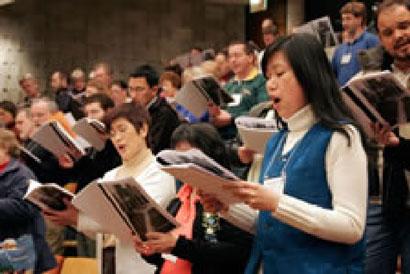Healthy Church Survey Soon Available

The Christian Reformed Church in North America hopes to soon make available a survey tool created to help churches in the denomination assess their health.
A mixture of 10 churches, including small, large, urban, and rural in Canada and the United States were involved in a pilot program that tested the value and content of the survey. Comments and reactions from the churches have helped the developers of the survey to revise and expand it.
“We created our own Healthy Church Index. This survey will help us engage with our churches on issues of health,” said Sandy Johnson, director of denominational ministries for the CRC.
The survey’s value is enhanced for churches if a trained coach walks alongside them as they interpret its results and apply its conclusions, said Johnson.
Synod 2006 approved the request of the CRC Board of Trustees to support a healthy church initiative. Support included setting aside ministry share funds for creating and sustaining healthy congregations.
Besides the Healthy Church survey, the initiative has involved creation of the Sustaining Congregational Excellence project, through which smaller congregations have been able obtain grants for projects that can help foster a church’s health and growth.
The survey includes 11 characteristics of a healthy church. These characteristics include such topics as the centrality of the Word to the congregation, worship that is joyful, commitment to evangelistic growth and church planting, and outreach to the poor and marginalized.
The difference between this survey and those available from other sources is that a church is asked to measure itself against its own accomplishments and priorities.
“The magic of this survey is it starts a process of assessing the health of a church through honest self-knowledge,” said Rodger Rice, director emeritus of Calvin College’s Center for Social Research and a member of the group working on the survey.
Churches are not asked to measure themselves against a national norm. Rather, the survey focuses on the individual church, encouraging it and its members to look at “the gaps between church perception and personal practices,” said Rice.
“Every church has issues and patterns. This survey helps a church answer the question of, ‘Are you measuring up to what you expect in your church and where you are with God?’” said Stan Koster, a Christian Reformed Home Missions church development specialist who has been part of the group working on the survey.
The survey also encourages churches to celebrate their gifts and successes. The survey is starting to be used by some churches and will be widely available soon, said Jack Tacoma, a ministry specialist for Home Missions and one of those who worked on the survey.
One church involved in the pilot study, he said, realized that it would be helpful to undertake a 40-day program of prayer to help enhance the health of church and its members.
“The survey helps a church do a sketch in time and determine what things they might want to put into place as they consider healthy church planning,” said Koster.
“The first thing is that the survey helps a congregation know who it is so that it can move honestly into the process of conversation.... We want the entire congregation to have ownership in this.”
Michael Bruinooge, director of The Network, said they examined several other congregational survey tools before deciding to develop the one used in the pilot study.
“We wanted a tool that was more holistic than others we saw and included important themes such as stewardship, justice, and compassion.
“We also wanted a survey that would be more inviting and less intimidating, because churches would not be measuring themselves against other churches,” said Bruinooge.


